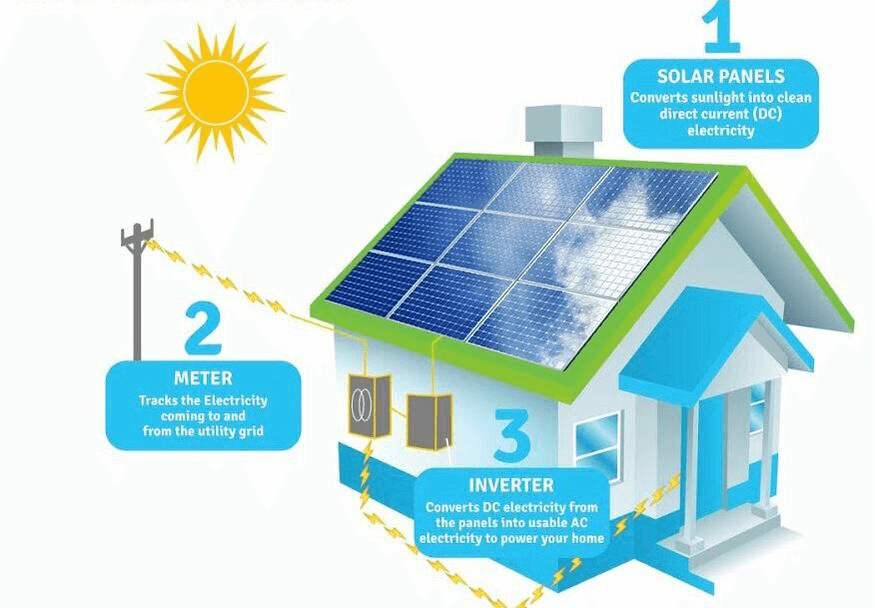Just How Solar Energy Can Aid You Save Money and Reduce Your Carbon Impact
The integration of solar power right into your energy profile presents an engaging opportunity for both financial savings and ecological stewardship. By using the sunlight's power, home owners can dramatically minimize their month-to-month utility expenses while likewise safeguarding versus the changability of future power expenses. The transition to solar contributes to a significant reduction in carbon discharges, straightening individual finance with wider environmental goals. As numerous federal government incentives appear, the question occurs: exactly how can one effectively browse the initial financial investments and recurring benefits of solar innovation to make best use of both financial and environmental gains?
Understanding Solar Energy Cost Savings
While the transition to solar power usually involves a first financial investment, understanding solar power cost savings is critical for homeowners and organizations alike. Solar power systems can dramatically minimize electricity expenses by using the sun's power, equating right into significant long-lasting monetary advantages. By producing their very own electricity, users reduce reliance on grid power, which goes through fluctuating costs. These financial savings can collect over time, commonly leading to a rapid roi.
Furthermore, solar energy systems may receive different economic motivations, consisting of tax credit scores and rebates, further boosting their cost-effectiveness. The accessibility of net metering allows customers to offer excess energy back to the grid, developing an extra revenue stream. These variables add to the overall savings connected with solar energy.

Along with route financial financial savings, solar power supplies the included advantage of raising home value. Homes equipped with solar panels are frequently more attractive to buyers, as they assure reduced power costs - Simply Solar Illinois. Recognizing these aspects is necessary for any individual thinking about solar energy, as it highlights not just the potential economic gains, yet likewise the wider environmental and financial benefits of embracing renewable resource remedies
Preliminary Expenses vs. Long-Term Benefits
When reviewing solar energy, it is very important to evaluate the first costs versus the long-term advantages. The upfront investment for solar panels, installation, and related tools can be significant, usually ranging from $15,000 to $30,000, depending on the system dimension and home energy demands. This preliminary expenditure might discourage some homeowners; nonetheless, it is important to consider the possible cost savings with time.
When installed, solar energy systems can considerably reduce or perhaps get rid of month-to-month electrical energy bills, causing substantial long-lasting financial advantages. Studies suggest that homeowners can conserve anywhere from $10,000 to $30,000 over the lifespan of their planetary system, usually 25 years. In addition, numerous states supply rewards, tax credit scores, and rebates that can offset initial prices, making solar extra obtainable.

Decreasing Your Carbon Impact
Minimizing your carbon footprint is an essential consideration in today's eco conscious culture, and adopting solar energy is one of one of the most reliable strategies to achieve this objective. Solar energy is a clean, eco-friendly source that dramatically reduces dependence on nonrenewable fuel sources, which are significant contributors to greenhouse gas discharges.

Furthermore, the blog extensive fostering of solar modern technology motivates the growth of eco-friendly work and supports advancements in energy storage and effectiveness. The even more people and organizations spend in solar energy, the higher the cumulative decrease in carbon emissions, fostering a cleaner atmosphere for future generations.
Government Rewards and Rebates
Taking on solar energy not only profits the atmosphere however can also result in substantial economic savings, particularly with the accessibility of federal government motivations and refunds. Numerous federal, state, and neighborhood programs are designed to encourage home owners and companies to purchase solar energy systems, making the shift a lot more inexpensive.
Among the most famous rewards is the Federal Financial Investment Tax Credit Scores (ITC), which allows solar system owners to deduct a considerable portion of the installation costs from their federal taxes. This motivation has been critical in minimizing the in advance expenditures related to solar power systems. Additionally, numerous states supply their own tax credit histories, gives, and discounts that can even more enhance savings.
Additionally, some city governments offer real estate tax exceptions for solar installments, ensuring that homeowners do not encounter boosted residential property taxes as a result of their eco-friendly power financial investments. Energy business might also offer rewards, consisting of internet metering and feed-in tolls, which allow solar energy users to offer excess power back to the grid.
Picking the Right Planetary System
Picking the appropriate planetary system is essential for maximizing power effectiveness and economic benefits. The choice pivots on several aspects, consisting of power needs, spending plan, and available room. Home owners must start by assessing their power intake to determine the system size needed for optimal performance.
Next, consider the different kinds of solar modern technologies readily available. Simply Solar Illinois. Photovoltaic (PV) panels are one of the most usual, transforming sunshine straight right into electrical power, while solar thermal systems focus on home heating water. Each type has unique advantages depending on specific requirements
Spending plan considerations are also critical. Preliminary installation expenses can differ significantly, so it is essential to compare quotes from numerous carriers and explore funding choices. Government motivations and rebates can additionally lower the economic burden, making solar systems a lot more available.
Verdict
The ecological benefits of solar power contribute to sustainable practices crucial for combating environment adjustment. Federal government motivations improve the expediency of solar technology fostering, motivating a shift towards a cleaner, extra financially efficient websites power resource.